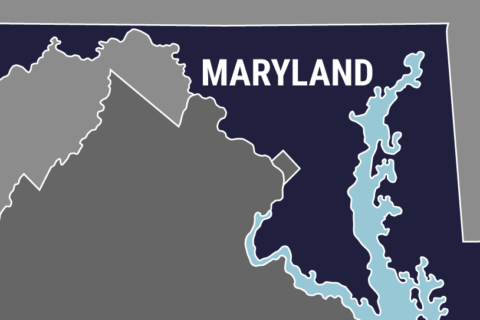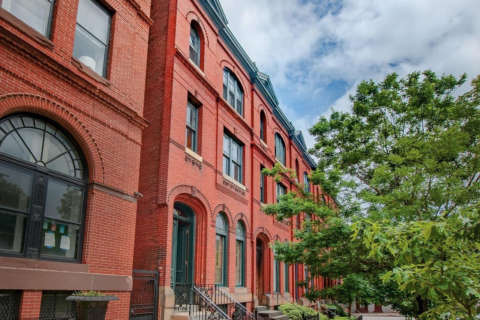ANNAPOLIS, Md. — Eduardo Sanchez is sleeping in his own bed, for once.
He’s taking a short break from work, but the majority of his time over the course of the next few months will be spent in Dallas, where the filmmaker best known for “The Blair Witch Project” is able to work on film and TV productions with what he says are better state tax incentives than in his native state of Maryland.
“I have a bunch of projects that I’d love to develop (in Maryland) that are, right now, dead in the water because of the (lack of) incentives,” Sanchez told Capital News Service.
“If (a new tax incentive bill) passes, that opens up a lot of new work here, and I don’t think I’m the only one in that position. I think a lot of people are waiting for this to happen.”
A push from local filmmakers like Sanchez for a new film tax credit plan reached the steps of the Maryland State House this year amid production of the shortened sixth and final season of Netflix’s 21-time Emmy nominee “House of Cards” in the Baltimore area.
According to CNS analysis of Maryland Film Office data, over the course of the past five fiscal years, 98 percent of film tax credits and grants — $72.5 million — has been allocated to “House of Cards” and “Veep,” the Julia Louis-Dreyfus political drama that relocated to California in 2015.
A new bill aimed at boosting the Maryland film scene was passed with amendments by the Maryland Senate Monday morning – the last day of the Maryland General Assembly’s 2018 legislative session – after it originally passed in the Senate mid-March and passed with amendments in the House April 6.
The legislation, Senate Bill 1154, sponsored by Sen. Douglas Peters, D-Prince George’s County, goes to Gov. Larry Hogan’s desk for his signature. If signed, it will take effect July 1.
“Years ago, we had productions in Baltimore and then the production would end and there would be no new production and we would lose employees — they would move to other states,” Del. Eric Luedtke, D-Montgomery County, who sponsored a bill identical to Peters’s in the Maryland House, told CNS. “We want to make sure there’s continuity in the industry.”
To qualify as a film production entity, film and TV projects — one season is considered a single project — are currently required to spend at least $500,000 in Maryland. The recently passed bill would reduce that requirement to $250,000.
Baltimore Film Office Director Debbie Dorsey told CNS she was thankful to Maryland lawmakers for “keeping the film industry alive,” noting the Peters bill’s ability to do “a little something for everybody,” big-name production entities and local, indie projects alike.
The Department of Commerce would also set aside 10 percent of its budget exclusively to accommodate small and independent entities, which would primarily help local filmmakers. The bill defines “small productions” as projects that spend $25,000 to $125,000 in-state and requires at least 50 percent of filming to be done in Maryland.
“I know a lot of filmmakers who are making movies for $50,000 at most and they get nothing,” Sanchez added. “That’s going to help a lot of people … but I still wish there was something to help the lower, lower productions.”
Sanchez recalled working on a film in Hagerstown in 2010. He said the state incentive program at the time allocated a small amount of money to the production. But unless explicitly earmarked for a certain project, it’s nearly impossible for low-budget projects to get much assistance.
“Since then, it’s kind of been the ‘House of Cards’ incentive program,” Sanchez said. “And they know it’s an important program and I’m glad they’ve been able to keep it in Maryland for sure, but there wasn’t much room for anybody else.”
Making room for others is the goal for more than a handful of local filmmakers and supporters. At a Maryland House Ways and Means Committee meeting March 7 to discuss Luedtke’s film tax credit bill, several local experts testified that lack of funding is the primary obstacle to building a larger film scene.
“Several times every month, my office and the Maryland state Film Office receive calls from production companies and producers who want to bring their film projects here,” Dorsey said. “And every July, as soon as we get the ‘open for business’ sign on the door, we have to flip it over and say ‘sorry, we’re closed.’”
In the last year and a half, 20 major films and TV shows have expressed serious interest in filming in Maryland, Dorsey estimated.
Among them: Steven Spielberg’s Oscar-nominee “The Post,” an Amazon show and a Hulu series, and HBO’s “The Immortal Life of Henrietta Lacks.” The latter settled for filming a handful of establishing shots in Baltimore before sending star Oprah Winfrey and the rest of the cast to Georgia.
Each project was turned away because “House of Cards” had consumed nearly all of the state’s annual budget, according to Dorsey.
Dorsey added in March that projects from HBO, Netflix, NBC and Lionsgate were awaiting confirmation of any new bill with a larger pool of funding before they could greenlight production in Maryland.
Even with SB 1154, the Baltimore Film Office may not have updates on those projects until the bill takes effect in July, according to Dorsey. Still, she noted that the bill will “provide consistency” and allow producers and studios to rely on Maryland as a production hub.
Filming in Maryland was always the plan for “The Blair Witch Project.”
Not only were Sanchez, who attended Wheaton High School and later Montgomery College, and co-director Daniel Myrick fans of the physical setting — ominous horror movie woods are just one of the many versatile location options Maryland has to offer — but also the two were inclined to work in a place where they knew and trusted the industry professionals.
“There’s enough infrastructure as far as editing places, places to get sound done; there’s already a production base here,” Sanchez said. “There’s a lot of great professionals here. You can get a fairly decent-sized production going without having to import everybody from L.A. or New York.”
Season 5 of “House of Cards” alone supported more than 1,700 Maryland businesses, according to Maryland Film Office data.
Goldsborough Glynn Classic Furnishings was among them. The Kensington-based small business has sold furniture to the “House of Cards” set decorator for the past six years.
Not only has the company benefited from the production’s purchases, as the owners wrote in a testimony letter to the Maryland General Assembly, it further profited from the media attention and word of mouth that comes with being associated with a high-profile TV show.
Since introducing the current film tax credit plan in 2012, the Maryland Department of Commerce helped finance 12 productions, nine of them individual seasons of “Veep” or “House of Cards.”
The department estimated that each production hired an average of 1,280 Maryland residents and worked with an average of 1,328 Maryland vendors. The combined projects have had a nearly $775 million impact on the state economy.
If anyone understands the capacity Maryland has to be a filmmaking hub, it’s Sanchez and Myrick. The two former college friends created “The Blair Witch Project” on an initial budget of less than $25,000, before the film went on to gross a whopping $249 million worldwide.
Nineteen years after its release, “Blair Witch” is still a local claim to fame as well as an example of small filmmakers’ potential for success.
“I think it’s common sense when you actually think about it,” Sanchez said. “You look at the other states who are actually building it and doing it right and it brings in work, and it’s also a cultural thing, too. It brings in artists. It’s beneficial way more beyond the actual work.”






